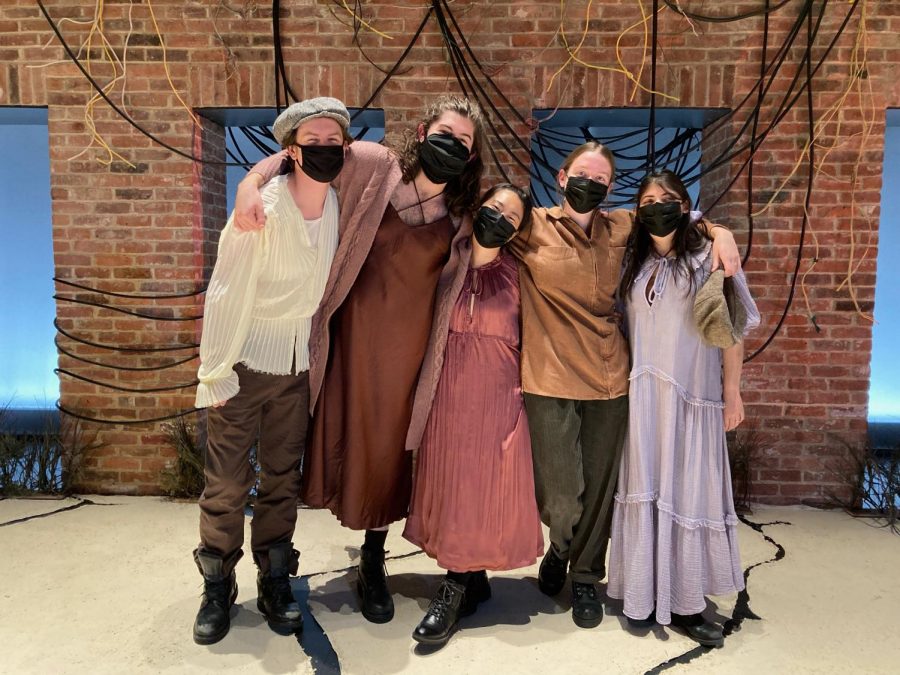Theatre dept.’s Yerma explores femininity, reproduction, gender
November 10, 2021

A tragic exploration of reproduction and the societal pressures of heterosexual relationships is reviving the theatre department’s in-person productions. Yerma, which premieres Nov. 11 and runs until Nov. 14, will be the first in-person theatre department show since 2020.
Yerma, written by poet-playwright Federico García Lorca in 1934, tells the story of a childless wife in rural Spain grappling with pressures surrounding reproduction and gender roles in relation to her husband. The play critiques societies that deny women the ability to choose their life paths — or judge them for their choices.
Visiting Lecturer in Theatre Sayda Trujillo, the show’s director, has taught, directed, and written theatre pieces around the world in places such as Guatemala, Singapore, and Spain. She is known for her solo shows Banana Leaves, Definitely Oops, I Was Raised Mexican, and Win the War or Tell Me a Story, which which have been presented internationally.
Trujillo told the Record that she wanted to come to the College to work with students who have a range of performing backgrounds. “Something that’s really important to me is working with actors and non-actors,” Trujillo said. “I was excited to work with students that are well-rounded and have a curiosity about theatre, rather than a kind of certainty that this is what they want to do.”
Trujillo normally creates original theatrical work, but said she connected with Yerma because of its poetic prose and presentation of current issues that would appeal to students. “I wanted to choose a play that I felt connected to, but also that students of any background would be able to step into and still have the experience of getting to know the heightened, poetic words,” she said.
The role of Yerma is played by three actors: Casey Monteiro ’24 will play Yerma in Act One, Eddie Wolfson ’23 will play Yerma in Act Two, and Lour Yasin ’23 will play Yerma in Act Three. Trujillo said she chose to cast three Yermas to avoid overwhelming the actors and to ensure the play was ensemble-based. Each Yerma has an ensemble role in two of the acts.
The cast expressed excitement about the social commentary in the tragedy. “Yerma is telling the story of someone who is desperately trying to find a way to exist in this very strict, specific society,” Wolfson said. “She is trying to live up to the norms and expectations of that society. Regardless of whether those norms are who Yerma is, they’re the only way she can see a future.”
Members of the cast said that having three Yermas enables each actor to embody a distinct moment in the play’s emotional timeline. “It is a tragedy, so you do see Yerma fall apart,” Monteiro said. “It’s interesting because when I play her, she’s really sweet and innocent. But then Eddie, who plays Yerma in the middle, helps you see the conflict unraveling, and then Lour, who plays Yerma at the end, embodies the most intense part where there’s actual fighting between the husband and wife.”
Going into the casting process, Trujillo said she was not sure who would audition, so she chose a play that could include all students. “I am a person of color who has lived and trained in predominantly white institutions so I am very aware of, in terms of inclusivity, what it has meant for me to wrestle with that world,” Trujillo said. “In choosing Yerma, I thought it was a play that had a way in for everybody — anybody who wants to do it. I wanted to be able to invite students of all backgrounds to have an experience.”
Wolfson, who is non-binary, said that Yerma’s depiction of a woman struggling with her gender identity and expression resonated with them. “There’s a line, ‘I go out to feed the oxen at night, which I never did before because no woman does. But in the darkness of the shed, my footsteps sound to me like the footsteps of a man,’” Wolfson said. “There’s a lot of trying to understand what your gender is if you can’t live up to what defines gender in this society, so I definitely think being non-binary adds a lot of color to the way I can play this part.”
Trujillo chose not to set the play in a specific time period or place to deepen the audience’s connection with the issues presented. “I feel that the themes in Yerma are appropriate to place in a kind of liminal space,” Trujillo said. “I think setting it in this kind of in-between place, which is how I’m thinking about it, just allows the actors and the characters to wrestle with the reality of not belonging and not fulfilling people’s expectations.”
The actors said that Yerma is a tragedy unlike others Williams has previously done. Trujillo said she is eager for audiences to come see the show. “I think students will enjoy seeing their fellow students tell a story that is important,” Trujillo said. “I think the cast is really finding the heart of it and they’re bringing themselves to telling the story.”
Correction: A previous version of this article incorrectly listed one of the actors, Casey Monteiro, as a member of the class of 2022. She is a member of the class of 2024.








